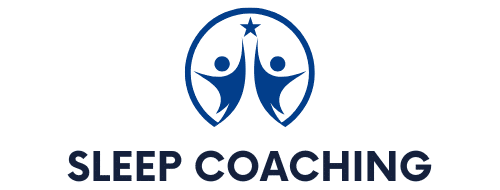Struggling to get a good night’s sleep? You’re not alone. Sleep plays a crucial role in everything from mood to overall health, yet many people find it difficult to achieve quality rest. That’s where sleep coaches step in. These specialists help individuals improve their sleep habits through personalized guidance and science-backed strategies.

But sleep coaches don’t work in isolation. By collaborating with healthcare providers, they create a more holistic approach to tackling sleep issues—ensuring better results for those struggling with chronic sleep problems.
In this post, we’ll explore how sleep coaches and healthcare professionals work together, why this collaboration matters, and how it can help you sleep better. If you’re tired of restless nights, read on—your best sleep could be just around the corner.
Table of Contents
What Does a Sleep Coach Do? Understanding Their Role
Sleep coaches play a vital role in improving sleep habits and overall well-being. By offering personalized guidance, they help individuals fall asleep faster, stay asleep longer, and wake up feeling refreshed. Their approach includes assessing current sleep patterns, identifying obstacles to quality rest, and providing actionable strategies for improvement.
What Sleep Coaches Actually Do
Sleep coaches use a variety of techniques to help clients achieve better sleep. Their responsibilities include:
- Personalized Sleep Plans: Crafting customized sleep strategies based on an individual’s needs, lifestyle, and challenges.
- Sleep Environment Evaluation: Assessing bedroom conditions to optimize factors like lighting, temperature, and comfort.
- Sleep Diary Analysis: Tracking sleep patterns through journals to pinpoint habits that may be interfering with rest.
- Goal Setting: Helping clients establish achievable sleep goals and milestones to track progress.
- Education: Teaching the principles of sleep hygiene, such as maintaining a consistent bedtime routine.
- Behavioral Modifications: Encouraging healthier sleep habits, like reducing screen time before bed.
- Stress Management Techniques: Introducing relaxation methods, such as deep breathing or meditation, to ease pre-sleep anxiety.
- Ongoing Support: Providing follow-ups and adjustments to ensure continued progress.
By using these strategies, sleep coaches can address a wide range of sleep issues, from difficulty falling asleep to disrupted sleep cycles.
The Science Behind Sleep Coaching
Research strongly supports the methods used by sleep coaches, demonstrating that individualized approaches to sleep improvement can yield significant benefits. Cognitive Behavioral Therapy for Insomnia (CBT-I)—a widely studied method—has been shown to reduce sleep disturbances effectively.
One study found that individuals who worked with sleep coaches experienced improved sleep quality and reduced insomnia symptoms. Techniques such as sleep restriction (limiting time in bed to improve sleep efficiency) and stimulus control (associating the bed only with sleep) are backed by research as effective interventions.
Moreover, maintaining a consistent sleep routine helps regulate the body’s internal clock, improving sleep onset and overall sleep quality. Studies also confirm that optimizing the sleep environment—such as reducing light and noise—leads to better rest.
By collaborating with healthcare providers, sleep coaches extend their expertise, ensuring clients receive holistic, science-backed sleep solutions tailored to their unique health needs.
How Sleep Coaches and Healthcare Providers Work Together
Sleep coaches work closely with healthcare providers to ensure comprehensive, well-rounded support for individuals struggling with sleep issues. By partnering with doctors, therapists, and specialists, they enhance the effectiveness of sleep improvement strategies. Let’s explore how these collaborations function in practice.
Building Relationships with Healthcare Providers
Establishing strong relationships with healthcare professionals is crucial for sleep coaches. By networking with doctors, sleep specialists, and mental health practitioners, they create a support system that benefits their clients. Here’s how they form these connections:
- Networking Events: Attending health fairs, medical conferences, and wellness expos to meet potential collaborators.
- Community Outreach: Hosting or participating in workshops and seminars to build credibility and educate the public.
- Referrals: Once trust is established, healthcare providers refer patients to sleep coaches for specialized, non-medical sleep support.
- Regular Communication: Maintaining open dialogue through check-ins, case discussions, and updates to strengthen professional relationships.
These efforts lay the groundwork for successful collaborations, ensuring a seamless integration of sleep coaching into broader healthcare strategies.
Sharing Patient Information for Better Outcomes
Effective communication between sleep coaches and healthcare providers is essential for achieving the best results. Sharing relevant patient insights allows for a more holistic and personalized approach to sleep improvement. Here’s why this collaboration matters:
- Holistic Understanding: Sleep coaches gain deeper insight into a client’s health history, medical conditions, and treatment plans, allowing for tailored sleep strategies.
- Informed Decision-Making: Healthcare providers can adjust treatments, medications, or therapies based on feedback from the sleep coach.
- Streamlined Care: Coordinated efforts prevent miscommunication, ensuring all professionals involved are aligned on patient progress and needs.
Confidentiality is always a priority in these collaborations. Coaches and healthcare providers must follow ethical guidelines and obtain proper consent before sharing patient information.
Working Together on Treatment Plans
By combining expertise, sleep coaches and healthcare providers create integrated treatment plans that address both medical and behavioral aspects of sleep improvement. Here’s how this teamwork unfolds:
- Assessing Needs: Collaboratively reviewing a patient’s sleep patterns, medical conditions, and lifestyle factors.
- Setting Goals: Establishing realistic sleep goals tailored to the individual’s health and daily routine.
- Monitoring Progress: Sleep coaches track improvements and report key observations, allowing providers to refine treatment strategies.
- Integrating Strategies: Merging clinical treatments with behavioral coaching techniques for a comprehensive, patient-centered approach to better sleep.
This synergy ensures that clients receive well-rounded, science-backed support tailored to their unique sleep challenges. By addressing sleep issues from multiple angles, sleep coaches and healthcare providers empower individuals to achieve lasting sleep improvements and better overall health.
Why Collaboration Matters: Better Results for Clients
When sleep coaches and healthcare providers join forces, the impact on patient care is profound. By integrating expertise, they develop more effective strategies to enhance sleep quality, health, and overall well-being. Let’s explore the key benefits of this collaboration.
Improved Patient Results
Collaboration between sleep coaches and healthcare professionals leads to better sleep outcomes for patients. Here’s how teamwork makes a difference:
- Tailored Strategies: By combining behavioral coaching with medical insights, sleep plans become highly personalized, addressing individual needs more effectively.
- Increased Accountability: Patients benefit from ongoing guidance from both a sleep coach and a healthcare provider, making them more likely to stay committed to their sleep improvement plan.
- Better Follow-Up: Regular check-ins ensure consistent progress tracking, keeping patients engaged and motivated.
- Faster Adjustments: If a plan isn’t working, both professionals can quickly refine strategies, ensuring patients get the best possible results.
Ultimately, this collaboration leads to higher success rates in improving sleep, reducing insomnia symptoms, and enhancing overall health.
A Holistic Approach to Sleep and Health
By working together, sleep coaches and healthcare providers take a comprehensive, whole-person approach to sleep improvement. Here’s what this integrated method looks like:
- Broader Perspective: With insights from both fields, underlying health conditions that impact sleep—such as anxiety, chronic pain, or hormonal imbalances—are more easily identified and addressed.
- Comprehensive Care: Patients receive well-rounded support that goes beyond sleep, incorporating stress management, lifestyle adjustments, and medical considerations.
- Diverse Resources: Sleep coaches offer practical sleep hygiene techniques, while healthcare providers provide medical expertise, ensuring patients have access to the best of both worlds.
- Multidisciplinary Support: A collaborative team—including doctors, sleep specialists, and mental health professionals—ensures that all aspects of sleep and wellness are covered.
This team-based approach creates a stronger support system, making it easier for patients to overcome sleep challenges and achieve long-term sleep success.
Overcoming Obstacles: Challenges in Collaboration
While collaboration between sleep coaches and healthcare providers offers significant benefits, it also comes with challenges. Differences in communication styles, treatment philosophies, and professional priorities can create hurdles that need to be addressed for successful partnerships.
Communication Barriers
One of the biggest challenges in collaboration is effective communication. Sleep coaches and healthcare providers often have different ways of discussing sleep issues, which can lead to misunderstandings. Common barriers include:
- Terminology differences: Sleep coaches may use behavioral sleep terms that aren’t widely recognized in medical settings, leading to confusion.
- Medical jargon: Healthcare providers may rely on clinical terminology that feels unfamiliar or overly technical to sleep coaches.
- Assumptions: Each party might assume the other understands certain concepts, creating gaps in knowledge and expectations.
- Limited time: Busy schedules can lead to rushed conversations, increasing the risk of miscommunication or missing key details.
Overcoming these barriers requires clear, open dialogue. Both parties can improve collaboration by asking clarifying questions, confirming understanding, and using simple, direct language when discussing treatment plans.
Differing Philosophies on Sleep Management
Sleep coaches and healthcare providers often approach sleep improvement from different perspectives, which can sometimes lead to friction. Key differences include:
- Focus areas: Sleep coaches emphasize behavioral and lifestyle changes, while healthcare providers may focus more on medical treatments and clinical interventions.
- Patient-centric vs. protocol-driven: Coaches typically tailor strategies to individual needs, whereas healthcare providers often follow standardized treatment protocols based on medical research.
- Lifestyle vs. medication: Sleep coaches prioritize non-medical interventions, while some healthcare providers may lean toward prescription solutions for certain sleep disorders.
These differing philosophies don’t have to create conflict. When both sides respect each other’s expertise and find common ground, they can develop integrated solutions that combine behavioral strategies with medical insights—ultimately leading to better outcomes for clients.
The Future of Sleep Coaching: Trends and Evolving Roles
The future of sleep coaching within healthcare is bright and full of possibilities. As sleep science continues to advance, the collaboration between sleep coaches and healthcare providers is expected to become more integrated and effective. Let’s explore emerging trends in sleep science and how healthcare providers may adapt to include sleep coaching in their practices.
Trends in Sleep Science
The field of sleep science is rapidly evolving, with new discoveries and technologies shaping how we understand and improve sleep. Key trends influencing sleep coaching include:
- Wearable sleep technology: More individuals are using devices to track their sleep patterns, providing sleep coaches with real-time data to create personalized improvement plans.
- Understanding sleep disorders: Increased research on conditions like sleep apnea and insomnia allows coaches to better support clients while working alongside healthcare providers.
- Cognitive behavioral strategies: Techniques like Cognitive Behavioral Therapy for Insomnia (CBT-I) are gaining recognition as effective, non-medical solutions for sleep challenges.
- Incorporating mindfulness: Meditation, deep breathing, and relaxation techniques are being integrated into sleep coaching programs to promote better rest.
- Sleep education: There is a growing push for sleep education in schools and communities to raise awareness about the importance of healthy sleep habits from an early age.
As these trends continue to develop, sleep coaching is becoming more data-driven and science-backed, leading to improved client outcomes.
Evolving Roles of Healthcare Providers
Healthcare providers are increasingly recognizing the impact of sleep on overall health and are adapting their roles to incorporate sleep coaching. Future developments may include:
- Training programs: More healthcare professionals may seek additional education in sleep coaching techniques to provide a comprehensive approach to patient care.
- Collaborative clinics: Multi-disciplinary sleep health clinics, where sleep coaches and healthcare providers work together, may become more common.
- Referrals to coaches: Doctors and specialists may routinely refer patients to sleep coaches for targeted, non-medical sleep support.
- Research and funding: Increased investment in sleep research could lead to formal studies on the effectiveness of sleep coaching, strengthening its credibility in the healthcare space.
- Integrated care models: Healthcare providers may adopt holistic care models that incorporate mental health, nutrition, and sleep coaching to improve patient outcomes.
As sleep coaching becomes more widely recognized as an essential part of preventative and therapeutic healthcare, the collaboration between sleep coaches and medical professionals is set to expand, offering even greater benefits for those seeking better sleep.
Final Thoughts: How Collaboration Shapes Sleep Health
The collaboration between sleep coaches and healthcare providers forms a powerful partnership dedicated to improving sleep quality. By combining expertise, they address sleep challenges from multiple perspectives, ensuring more personalized and effective solutions for individuals struggling with sleep.
As awareness of sleep coaching continues to grow, these partnerships are expected to expand, making sleep support more accessible and integrated into healthcare. If you’ve ever considered working with a sleep coach or exploring professional guidance for better sleep, now might be the perfect time to start.
Sleep Coaching & Healthcare Collaboration FAQ
What is a sleep coach, and how do they help with sleep issues?
A sleep coach is a professional who helps individuals improve their sleep habits using non-medical, behavioral strategies. They assess sleep patterns, provide personalized sleep plans, and offer guidance on optimizing sleep hygiene. Sleep coaches work with clients to develop consistent routines, manage stress, and address lifestyle factors affecting sleep quality.
How do sleep coaches collaborate with healthcare providers?
Sleep coaches often work alongside doctors, sleep specialists, and mental health professionals to provide comprehensive sleep support. They may receive referrals from healthcare providers, share insights about a client’s sleep progress, and integrate behavioral sleep strategies with medical treatments when necessary. This collaboration ensures a holistic approach to managing sleep disorders and improving overall health.
What are the benefits of collaboration between sleep coaches and healthcare providers?
By working together, sleep coaches and healthcare professionals can:
• Develop personalized treatment plans tailored to the individual’s needs.
• Provide multi-disciplinary support, addressing medical and behavioral aspects of sleep.
• Improve patient accountability, helping individuals follow through on sleep strategies.
• Ensure faster adjustments to treatment plans if an approach isn’t working.
This partnership enhances the effectiveness of sleep interventions, leading to better long-term sleep health for clients.
Do sleep coaches diagnose or treat medical sleep disorders?
No, sleep coaches do not diagnose or prescribe treatments for medical sleep disorders such as sleep apnea or restless leg syndrome. Instead, they focus on behavioral and lifestyle changes that support healthy sleep. If a medical issue is suspected, they refer clients to healthcare providers for proper diagnosis and treatment.
What are some common challenges in sleep coaching collaboration?
While collaboration between sleep coaches and healthcare providers is beneficial, it comes with challenges such as:
• Communication barriers, including differences in terminology and medical jargon.
• Differing treatment philosophies, as coaches focus on behavior while providers may emphasize medical interventions.
• Time constraints, making it difficult for busy healthcare providers to engage in extended collaboration.
Overcoming these challenges requires clear communication, mutual respect, and a shared commitment to improving patient outcomes.
How does wearable sleep technology fit into sleep coaching?
Wearable sleep devices, such as Oura Rings and Fitbit sleep trackers, provide real-time sleep data that sleep coaches can use to create personalized sleep strategies. These devices track sleep duration, sleep stages, and disruptions, allowing coaches to monitor progress and adjust recommendations accordingly.
How can healthcare providers integrate sleep coaching into their practice?
Healthcare providers can incorporate sleep coaching by:
• Partnering with sleep coaches for referrals and consultations.
• Offering sleep coaching as an additional service within multi-disciplinary clinics.
• Providing patient education on sleep hygiene and behavioral sleep strategies.
• Researching and funding sleep coaching studies to strengthen its credibility in the medical field.
By embracing sleep coaching, providers can enhance patient care and address sleep issues more effectively.
What role does Cognitive Behavioral Therapy for Insomnia (CBT-I) play in sleep coaching?
CBT-I is a scientifically backed method for treating insomnia that focuses on changing negative thoughts and behaviorsthat disrupt sleep. Many sleep coaches incorporate CBT-I techniques into their programs, using methods like sleep restriction, stimulus control, and relaxation techniques to help clients improve their sleep patterns.
Can sleep coaching replace medical treatment for sleep disorders?
No, sleep coaching is not a substitute for medical treatment. It is a complementary approach that focuses on behavioral changes. Individuals with serious sleep disorders such as obstructive sleep apnea should seek medical evaluation and treatment from a healthcare provider.
What does the future hold for sleep coaching in healthcare?
As awareness of sleep’s impact on overall health grows, sleep coaching is expected to become more integrated into healthcare settings. Future trends may include:
• More training programs for healthcare providers to learn sleep coaching techniques.
• Collaborative clinics where sleep coaches work alongside doctors and specialists.
• Increased research funding to validate the effectiveness of sleep coaching.
• Expanded use of technology, such as AI-driven sleep tracking and biofeedback tools.
With these advancements, sleep coaching is set to play a larger role in preventative healthcare and wellness.
How can I find a qualified sleep coach?
If you’re looking for a certified sleep coach, you can:
• Search through trusted directories, such as SleepCoaching.com.
• Look for certified programs that train professional sleep coaches.
• Check for client testimonials and reviews to gauge effectiveness.
• Ask healthcare providers for referrals to reputable sleep coaches.
Finding the right sleep coach ensures that you receive expert guidance tailored to your sleep needs.
Next Steps for Better Sleep
If you’re inspired by the collaboration between sleep coaches and healthcare providers, now is the time to take action. Whether you’re looking to improve your own sleep or considering professional support, explore how a sleep coach can make a difference. Connect with certified sleep coaches, talk to your healthcare provider, and start your journey to better rest today!
Stone Evans, Founder of SleepCoaching.com
Stone Evans is the founder of SleepCoaching.com which has become one of the most popular destinations online for people seeking better sleep. Stone started developing this website after realizing his own sleep struggles and then beginning an intensive period of study (which included professional sleep coach training) and ongoing lifestyle changes to improve and optimize his sleep.
Now through in-depth articles from sleep experts around the world, the internet's leading and most comprehensive sleep coaching directory, quantitative sleep product reviews and Stone's personal daily sleep tracking journey, visitors to our website regularly report gaining information and insights that are helping them achieve better health, better sleep and a better quality of life.

